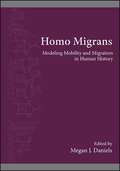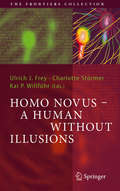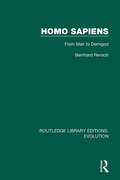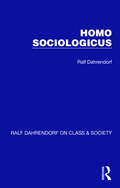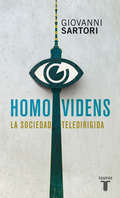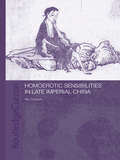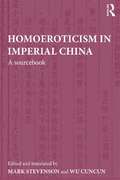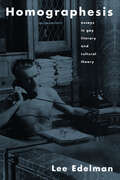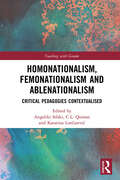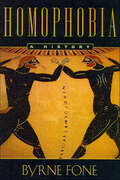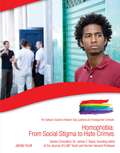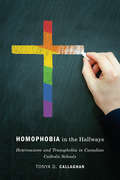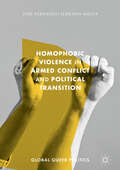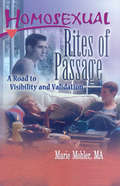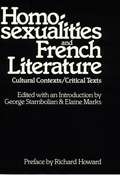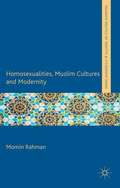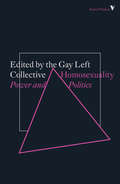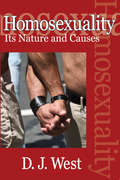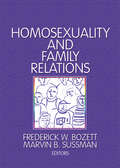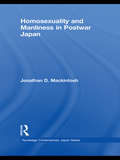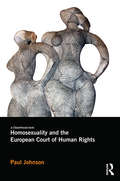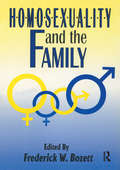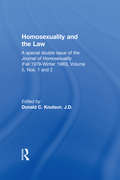- Table View
- List View
Homo Migrans: Modeling Mobility and Migration in Human History (SUNY series, The Institute for European and Mediterranean Archaeology Distinguished Monograph Series)
by Megan J. DanielsOne of the most significant challenges in archaeology is understanding how (and why) humans migrate. Homo Migrans examines the past, present, and future states of migration and mobility studies in archaeological discourse. Contributors draw on revolutionary twenty-first-century advances in genetics, isotope studies, and data manipulation that have resolved longstanding debates about past human movement and have helped clarify the relationships between archaeological remains and human behavior and identity. These emerging techniques have also pressed archaeologists and historians to develop models that responsibly incorporate method, theory, and data in ways that honor the complexity of human behavior and relationships. This volume articulates the challenges that lie ahead as scholars draw from genomic studies, computational science, social theory, cognitive and evolutionary studies, environmental history, and network analysis to clarify the nature of human migration in world history. With case studies focusing on European and Mediterranean history and prehistory (as well as global history), Homo Migrans presents integrated methodologies and analyses that will interest any scholar researching migration and mobility in the human past.
Homo Novus - A Human Without Illusions
by Ulrich J. Frey Kai P. Willführ Charlotte StörmerConverging evidence from disciplines including sociobiology, evolutionary psychology and human biology forces us to adopt a new idea of what it means to be a human. As cherished concepts such as free will, naïve realism, humans as creation's crowning glory fall and our moral roots in ape group dynamics become clearer, we have to take leave of many concepts that have been central to defining our humanness. What emerges is a new human, the homo novus, a human being without illusions. Leading authors from many different fields explore these issues by addressing a range of illusions and providing evidence for the need, despite considerable reluctance, to relinquish some of our most cherished ideas about ourselves.
Homo Psyche: On Queer Theory and Erotophobia
by Gila AshtorWinner, Alan Bray Memorial Book Award2022 Lammy Finalist, LGBTQ StudiesCan queer theory be erotophobic? This book proceeds from the perplexing observation that for all of its political agita, rhetorical virtuosity, and intellectual restlessness, queer theory conforms to a model of erotic life that is psychologically conservative and narrow. Even after several decades of combative, dazzling, irreverent queer critical thought, the field remains far from grasping that sexuality’s radical potential lies in its being understood as “exogenous, intersubjective and intrusive” (Laplanche). In particular, and despite the pervasiveness and popularity of recent calls to deconstruct the ideological foundations of contemporary queer thought, no study has as yet considered or in any way investigated the singular role of psychology in shaping the field’s conceptual impasses and politico-ethical limitations.Through close readings of key thinkers in queer theoretical thought—Eve Kosofsky Sedgwick, Leo Bersani, Lee Edelman, Judith Butler, Lauren Berlant, and Jane Gallop—Homo Psyche introduces metapsychology as a new dimension of analysis vis-à-vis the theories of French psychoanalyst Jean Laplanche, who insisted on “new foundations for psychoanalysis” that radically departed from existing Freudian and Lacanian models of the mind. Staging this intervention, Ashtor deepens current debates about the future of queer studies by demonstrating how the field’s systematic neglect of metapsychology as a necessary and independent realm of ideology ultimately enforces the complicity of queer studies with psychological conventions that are fundamentally erotophobic and therefore inimical to queer theory’s radical and ethical project.
Homo Sapiens: From Man to Demigod (Routledge Library Editions: Evolution #9)
by Bernhard RenschOriginally published in 1972, Homo Sapiens examines how humans emerged from among the millions of other species and achieved our unique position within the animal kingdom. The book examines what direction future evolution will take and what may be regarded as the ‘meaning’ of human existence. It stipulates that these are the questions for which no real basis of discussion existed before the 20th century, and at the time of publication, some were still without a definite answer. The book sets out analyse these questions and the continuing debate that has arisen from their study. This is an account of the uniqueness of man in the animal kingdom, how this uniqueness arose during evolution, and what traces of it can be detected in animals other than man. The book describes the mental and physical evolution of man, from his earliest ancestors to the present day. He also gives an account of man’s cultural development seeking to establish that there is an underlying principal of cultural evolution, a principle that has been denied by many historians. Later chapters deal with the future and with possible forecasts of mankind’s further physical, intellectual and cultural evolution.
Homo Sociologicus (Ralf Dahrendorf on Class & Society #3)
by Ralf DahrendorfFirst published in English as part of the Essays in the Theory of Society, this volume reissues the stand-alone Homo Sociologicus for which the author wrote a new introduction when it was originally published in 1973. The controversial book deals with the history, significance and limits of the category of social role and discusses the dilemma posed by homo sociologicus. The author shows that for society and sociology, socialization invariably means depersonalization, the yielding up of man’s absolute individuality and liberty to the constraint and generality of social roles. This volume includes the essay, Sociology and Human Nature, written as a postscript to Homo Sociologicus.
Homo videns: La sociedad teledirigida (Pensamiento Ser.)
by Giovanni SartoriUn clásico sobre la constante transformación del hombre ante la sociedad de la imagen. Nos encontramos en plena revolución multimedia. El homo sapiens, producto de la cultura escrita, se está transformando en un homo videns para el cual la palabra ha sido destronada por la imagen. Y en todo ello la televisión cumple un papel determinante. La primacía de lo visible sobre lo inteligible lleva a un ver sin entender que ha acabado con el pensamiento abstracto, con las ideas claras y distintas. Ésta es la premisa fundamental a partir de la cual el gran pensador italiano Giovanni Sartori examina en esta obra -ya clásica y, sin embargo, hoy más actual que nunca- la vídeo-política y el poder político de la televisión; la conversión del vídeo-niño en un adulto sordo de por vida a los estímulos de la lectura y del saber transmitidos por la cultura escrita; la formación de la opinión pública, y la cantidad de saber que pasa -y no pasa-a través de los canales de comunicación de masas. Ante el avance imparable de la edad multimedia ¿aparecerá una nueva forma de pensar, un postpensamiento acorde a la nueva cultura audiovisual? Reseñas:«Un ensayo polémico y exasperadamente inteligente, que reivindica la complejidad de la palabra frente a las videosimplezas, y el conocimiento frente a la mera información.»Fernando Savater «Un libro estimulante que va contracorriente. Un aguijón para despabilar a las víctimas de la videoanestesia, una contribución al salvamento de la cultura, una invitación a buscar la realidad en la maraña de la sobreinformación y de la imagen, que a veces desconcierta y "también miente"... Sartori sostiene que el consumo de televisión está creando un hombre empobrecido, crédulo, inocentón y marcado por la atrofia cultural.»Justino Sinova, El Mundo «Un alegato contra el poder de la televisión, contra la falsa creencia de que una imagen vale más que mil palabras y una llamada de alerta ante los efectos negativos producidos en toda una generación que ha conocido las imágenes televisivas antes que la letra impresa.»Ángel Vivas, El Mundo «Este magnífico ensayo de Giovanni Sartori debería ser de lectura obligatoria en todas las escuelas y universidades.»Il Gazzettino «Un libro que arrastra: cuando el ataque es así de violento pero a la vez tan agudo, así de desconcertante pero tan soberbiamente ultrajoso en comparación con la torpeza tecnológica, implica que ya no conseguiremos acercarnos mas a una realidad sin por ello cambiar radicalmente la desoladora relación que tenemos con ella.»Corriere della Sera «El nuevo libro de Giovanni Sartori es un feroz alegato contra la televisión y una señal de alarma frente a los desastres que este potente medio de comunicación está introduciendo en la naturaleza y en las costumbres de nuestra especie. [...] El politólogo da la voz de alarma: la multimedialidad y la videocracia son un terrible autogol de la humanidad.»L'Espresso
Homoerotic Sensibilities in Late Imperial China (Routledge/Asian Studies Association of Australia (ASAA) East Asian Series #Vol. 7)
by Cuncun WuHomoerotic Sensibilities in Late Imperial China is the richest exploration to date of late imperial Chinese literati interest in male love. Employing primary sources such as miscellanies, poetry, fiction and 'flower guides', Wu Cuncun argues that male homoeroticism played a central role in the cultural life of late imperial Chinese literati elites. Countering recent arguments that homosexuality was marginal and disparaged during this period, the book also seeks to trace the relationship of homoeroticism to status and power.In addition to historical portraits and analysis, the book also advances the concept of 'sensibilities' as a method for interpreting the complex range of homoerotic texts produced in late imperial China.
Homoeroticism in Imperial China: A Sourcebook
by Mark Stevenson Wu CuncunBringing together over sixty pre-modern Chinese primary sources on same-sex desire in English translation, Homoeroticism in Imperial China is an important addition to the growing field of the comparative history of sexuality and provides a window onto the continuous cultural relevance of same-sex desire in Chinese history. Negotiating what can be a challenging area for both specialists and non-specialists alike, this sourcebook provides: accurate translations of key original extracts from classical Chinese concise explanations of the context and significance of each entry translations which preserve the aesthetic quality of the original sources An authoritative and well organised guide and introduction to the original Chinese sources, this sourcebook covers histories and philosophers, poetry, drama (including two complete plays), fiction (including four complete short stories and full chapters from longer novels) and miscellanies. Each of these sections are organised chronologically, and as well as the general introduction, short introductions are provided for each genre and source. Revealing what is a remarkably sophisticated and complex literary tradition, Homoeroticism in Imperial China is an essential sourcebook for students and scholars of Imperial Chinese history and culture and sexuality studies.
Homographesis: Essays in Gay Literary and Cultural Theory
by Lee EdelmanFirst published in 1994. Routledge is an imprint of Taylor & Francis, an informa company.
Homonationalism, Femonationalism and Ablenationalism: Critical Pedagogies Contextualised (Teaching with Gender)
by Angeliki SifakiThis edited volume engages with a range of geographical, political and cultural contexts to intervene in ongoing scholarly discussions on the intersection of nationalism with gender, sexuality and race. The book maps and analyses the racially and sexually normativising power of homonationalist, femonationalist and ablenationalist dynamics and structures, three strands of research that have thus far remained separate. Scholars and practitioners from different geopolitical and academic contexts highlight research on the complexities of women’s, LGBTQ+ communities’ and dis/abled individuals’ engagements with and subsumption within nationalist projects. Homonationalism, Femonationalism and Ablenationalism: Critical Pedagogies Contextualised offers added value for those researching and teaching on topics related to gender, sexuality, disability, (post)coloniality and nationalism and includes new pedagogical strategies for addressing such timely global phenomena. This dynamic interdisciplinary volume is ideal for those teaching gender studies, and for students and scholars in gender studies, international relations and sexuality studies.
Homophobia: A History
by Byrne FoneA pioneering scholar of gay and lesbian studies presents an illuminating history of homophobia from ancient Athens to the halls of Congress.In this tour de force of historical and literary research, Byrne Fone, professor emeritus at the City University of New York, chronicles the evolution of homophobia through the centuries. Delving into literary sources as diverse as Greek philosophy, Elizabethan poetry, the Bible, and the Victorian novel, as well as historical texts and propaganda ranging from the French Revolution to the Moral Majority to the transcripts of current TV talk shows, Fone reveals how and why same-sex desire has long been the object of legal, social, religious, and political persecution.This groundbreaking work combines “a masterful command of history [with] an explosive set of assertions that fly against the conventional view of not just homophobes but of gay people themselves” (Michael Alvear, Salon).
Homophobia: From Social Stigma to Hate Crimes
by Jamie HuntThe 1998 murder of 21-year-old college freshman Matthew Shepard brought home to many Americans the issue of homophobia and hate crimes against lesbian, gay, bisexual, and transgender (LGBT) people. Eventually, it led to legislation at the federal level against people who commit hate crimes. But homophobia, the fear and hatred of gay people, has a long history, and despite many advances by the LGBT community, homophobia continues in our own society and around the world. Learn about the ways homophobia oppresses LGBT people, their fight for civil rights, and why an end to prejudice against gay people is important for all Americans. Examine how you yourself might be homophobic. And finally, explore the ways young people--straight and gay--can work together toward mutual understanding, respect, and a better future for all of us by ending homophobia.
Homophobia: A Weapon of Sexism
by Suzanne PharrFor anyone wishing a greater understanding of how homophobia functions to keep all people not just lesbian, gay, bisexual, transgender, or questioning from realizing their full potential.
Homophobia in the Hallways: Heterosexism and Transphobia in Canadian Catholic Schools
by Tonya D. CallaghanSection 15 of the Canadian Charter of Rights and Freedoms ensures equality regarding sexual orientation and gender identity in Canada. Despite this, gay, lesbian, and gender-nonconforming teachers in publicly-funded Catholic schools in Ontario and Alberta are being fired for living lives that Church leaders claim run contrary to Catholic doctrine about non-heterosexuality; meanwhile, requests from students to establish Gay/Straight Alliances are often denied. In Homophobia in the Hallways, Tonya D. Callaghan interrogates institutionalized homophobia and transphobia in the publicly-funded Catholic school systems of Ontario and Alberta. Featuring twenty interviews with students and teachers who have faced overt discrimination in Catholic schools, the book blends theoretical inquiry and real-world case study, making Callaghan’s study a unique insight into religiously-inspired heterosexism and genderism. She uncovers the causes and effects of the long-standing disconnect between Canadian Catholic schools and the Charter by comparing the treatment of and attitudes towards lesbian, gay, bisexual, transgender and queer teachers and students in these publicly-funded systems.
Homophobic Violence in Armed Conflict and Political Transition
by José Fernando Serrano-AmayaThis book argues that homophobia plays a fundamental role in disputes for hegemony between antagonists during political transitions. Examining countries not often connected in the same research—Colombia and South Africa—the book asserts that homophobia, as a form of gender and sexual violence, contributes to the transformation of gender and sexual orders required by warfare and deployed by armed groups. Anti-homosexual violence also reinforces the creation of consensus around these projects of change. The book considers the perspective of individuals and their organizations, for whom such hatreds are part of the embodied experience of violence caused by protracted conflicts and social inequalities. Resistance to that violence are reason to mobilize and become political actors. This book contributes to the increasing interest in South-South comparative analyses and the need of theory building based on case-study analyses, offering systematic research useful for grass root organizations, practitioners, and policy makers.
Homosexual Rites of Passage: A Road to Visibility and Validation
by Marie MohlerHomosexual Rites of Passage: A Road to Visibility and Validation will help you, as a gay or lesbian individual, work through identity issues, come out, and become visible in a healthy and safe manner. You will find this unique book to be an excellent resource for validation and support during your courageous acts of personal growth. Furthermore, you will discover a positive affirmation of homosexual identities as well as issues that impede or prevent your positive homosexual identity formation. Homosexual Rites of Passage facilitates your journey toward visibility and personal validation by naming fear and shame as obstacles of your growth and describing affirming homosexual rites of passage so that you will not feel alone in your journey through life. Throughout Homosexual Rites of Passage, you will explore the essential relationship between homosexual identity development and rites of passage, or life experiences or events that mark emotional, familial, and growth transitions in your life and that they are different for homosexuals than for heterosexuals. Compelling and informative, this important book discusses how homophobia and homosexuals’internalized shame often cause these rites of passage to be ignored or not considered valid rituals for gay men and lesbians. You will find helpful and insightful ideas in this informative book to help you affirm your homosexual identity, such as: discovering the definitions of the stages of homosexual identity formation and their significance in defining your view of self and others examining outlines and descriptions of obstacles that prevent positive homosexual identity development, such as fear, shame, and guilt learning to address the role and significance of rites of passage in creating personal identity and space analyzing the description of rites of passage that is specific to the homosexual community and that covers developmental milestones from birth to death, such as coming out or choosing a life partnerHomosexual Rites of Passage will assist your homosexual identity development through the celebration of homosexual rituals and rites of passage in a positive effective way. This valuable book addresses the issues that may impede your positive homosexual identity development and provides you with strategies to heal wounded and shamed identities, as well as providing you with a thorough description of homosexual rites of passage to help you understand and validate your homosexual identity.
Homosexualities and French Literature: Cultural Contexts, Critical Texts
by George Stambolian Elaine MarksHow significant a role does homosexuality play in the work of an individual writer? Is there a homosexual imagination, a creative impulse that can be described as distinctly homosexual? What effect have the women's and gay liberation movements had on the context of literary discussion? This provocative and ground-breaking volume confronts such questions head-on in offering a wide diversity of perspectives on the relationship of homosexuality--as a literary, social, psychological, and political phenomenon--to the rich corpus of French literature and critical theory. It consists of six interviews and fifteen essays, all but one of which were written expressly for this volume, representing a variety of critical approaches. Among the contributors to the first part, "Cultural Contexts," are leading psychoanalysts, feminists, writers, and thinkers in France and the United States. In essays and interviews, they raise important questions about the interaction of discourse with sexuality, desire, oppression, and consciousness. The essays in the second part, "Critical Texts," focus on the works of individual writers from the eighteenth century to the present. They reveal how 7 poets and novelists, in struggling with language, made use of, and irrevocably altered, the literary conventions and psychological preconceptions of their time. Among the authors treated are the Marquis de Sade, George Sand, Baudelaire, Proust, Gide, Colette, Cocteau, Sartre, Genet, Violette Leduc, and Monique Wittig.
Homosexualities, Muslim Cultures and Modernity
by Momin RahmanThis book addresses the increasing role of queer politics within forms of Islamophobia, both by exploring the framing of lesbian, gay, bisexual, and transgender (LGBT) issues as a key marker of western superiority and by identifying the ways in which Muslim homophobia contributes to this dialectic.
Homosexuality: Power and Politics
by Gay Left CollectiveA socialist journal edited by gay men in the 1970sAfter the leading organizations of radical sexual politics - the Gay Liberation Front and the Gay Marxist Group - imploded or dissolved, the Gay Left Collective formed a research group to make sense of the changing terrain of sexuality and politics writ large. Its goal was to formulate a rigorous Marxist analysis of sexual oppression, while linking together the struggle against homophobia with a wider array of struggles, all under the banner of socialism. This anthology combines the very best of their work, exploring masculinity and workplace organizing, counterculture and disco, the survivals of victorian morality and the onset of the HIV/AIDS crisis.
Homosexuality: Its Nature and Causes
by Donald J. WestThe subject of homosexuality, and especially male homosexuality, has received a great deal of publicity in England and America. The furor began with Kinsey's famous reports on sexual behavior, which brought out the fact that a far higher proportion of the population than was commonly supposed deviated from accepted standards of normality and morality. Taking courage from the apparent safety of large numbers, the sexually unorthodox and their sympathizers began to challenge the criteria of normality, and to question whether sexual habits that were widespread and so deeply entrenched could justifiably be written off as immoral. D.J. West's "Homosexuality" dissects the myths and paranoia surrounding this topic by examining the nature and roots of homosexuality.The politico-legal controversy has tended to overshadow the more fundamental psychological questions concerning the nature and causes of homosexuality. In this field, no striking discoveries have resulted from the increased public interest. Nevertheless, a body of factual data has accumulated, and a number of theories are available. The author's main purpose is to summarize as clearly as possible what is known, to draw what practical conclusions may be possible, and to point out where we are still groping and ignorant.This book deals mainly with male homosexuality because in men the condition causes more clear cut social problems and has been studied more intensely by psychiatrists. Unfortunately, though strongly held opinions abound, hard facts about homosexuality and its possible causes are difficult to obtain. Even now, serious medical and sociological investigations in this subject are scandalously few considering the importance of the questions in human terms. This resistance becomes acutely apparent when a social until a large section of the public is prepared to face the facts squarely and rationally and to support adequate research, our knowledge will remain rudimentary. This book clears away the debris of myth and misunderstanding in a vital area of social concern.
Homosexuality and Family Relations
by Marvin B SussmanThe first book of its kind, Homosexuality and Family Relations focuses on the effects of homosexuality and being homosexual on individuals in families and on the family as a group. Edited by Frederick W. Bozett, RN, DNS, and Marvin B. Sussman, PhD, this informative and enlightening volume examines the multiple varieties of family forms in which gay men and lesbians live, addresses the ramifications of homosexuality on family relationships, and explores the countless aspects of parenthood as they are experienced by gay men and lesbians, including adoption and foster care by lesbians and gay men, and the choice of increasing numbers of lesbians to bear children through artificial fertilization. Any professional who is interested in the family--educators, clinicians, academicians, researchers, and students, as well as others interested in families and in human sexuality and men’s and women’s studies--family science, gay studies, nursing, medicine, law, psychology, sociology, social work--will find this book useful, insightful, and unique.
Homosexuality and Manliness in Postwar Japan (Routledge Contemporary Japan Series)
by Jonathan D. MackintoshJapan’s first professionally produced, commercially marketed and nationally distributed gay lifestyle magazine, Barazoku (‘The Rose Tribes’), was launched in 1971. Publicly declaring the beauty and normality of homosexual desire, Barazoku electrified the male homosexual world whilst scandalising mainstream society, and sparked a vibrant period of activity that saw the establishment of an enduring Japanese media form, the homo magazine. Using a detailed account of the formative years of the homo magazine genre in the 1970s as the basis for a wider history of men, this book examines the relationship between male homosexuality and conceptions of manliness in postwar Japan. The book charts the development of notions of masculinity and homosexual identity across the postwar period, analysing key issues including public/private homosexualities, inter-racial desire, male-male sex, love and friendship; the masculine body; and manly identity. The book investigates the phenomenon of ‘manly homosexuality’, little treated in both masculinity and gay studies on Japan, arguing that desires and individual narratives were constructed within (and not necessarily outside of) the dominant narratives of the nation, manliness and Japanese culture. Overall, this book offers a wide-ranging appraisal of homosexuality and manliness in postwar Japan, that provokes insights into conceptions of Japanese masculinity in general.
Homosexuality and the European Court of Human Rights
by Paul JohnsonHomosexuality and the European Court of Human Rights is the first book-length study of the Court’s jurisprudence in respect of sexual orientation. It offers a socio-legal analysis of the substantial number of decisions and judgments of the Strasbourg organs on the wide range of complaints brought by gay men and lesbians under the European Convention on Human Rights. Providing a systematic analysis of Strasbourg case law since 1955 and examining decades of decisions that have hitherto remained obscure, the book considers the evolution of the Court’s interpretation of the Convention and how this has fashioned lesbian and gay rights in Europe. Going beyond doctrinal analysis by employing a nuanced sociological consideration of Strasbourg jurisprudence, Paul Johnson shows how the Court is a site at which homosexuality is both socially constructed and regulated. He argues that although the Convention is conceived as a ‘living instrument’ to be interpreted ‘in the light of present-day conditions’ the Court’s judgments have frequently forged and advanced new social conditions in respect of homosexuality. Johnson argues that the Court’s jurisprudence has an extra-legal importance because it provides an authoritative and powerful discursive resource that can be mobilized by lesbians and gay men to challenge homophobic and heteronormative social relations in contemporary societies. As such, the book considers how the Court’s interpretation of the Convention might be evolved in the future to better protect lesbian and gay rights and lives.
Homosexuality and the Family
by Frederick W. Bozett, RN, DNSDisproving the notion that homosexuals are antifamily, this enlightening book details the variety of family forms in which gays and lesbians live and explores the effects of homosexuality on individuals in families and on the family as a whole. Little in the professional literature addresses the combined topics of homosexuality and the family, so practitioners, academicians, researchers, and students in various disciplines--counseling, gay studies, sociology, human sexuality, psychology, social work, law, and medicine--will discover a wealth of unique and useful material here. Arranged in a life history sequence that moves from adolescence to adulthood, this informative volume documents the responses of parents of gay children, wives of gay men, children of lesbian mothers, and gay fathers about their family lives.
Homosexuality and the Law
by Donald C. Knutson, J.D.A fascinating exploration of how the law--as viewed and decided by the courts--often embodies fear and prejudice against homosexuality, and thereby, becomes the instrument for discrimination. This valuable book covers a wide range of subjects, illustrating the extent to which the lives of gay persons are touched by these laws and providing a highly critical examination of the response by the American judicial system to our claims for equal protection under the law. Leading law professors and practicing lawyers address the important legal issues and court decisions relevant to male and female homosexuality--criminal punishment for gay sex acts, employment discrimination, child custody, gay organizational rights, and more.
